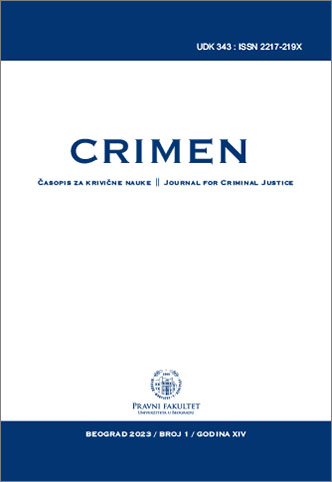SUZBIJANJE NEZAKONITE TRGOVINE KULTURNIM DOBRIMA
COMBATING TRAFFICKING OF CULTURAL HERITAGE
Author(s): Gordana KrstićSubject(s): Anthropology, Social Sciences, Law, Constitution, Jurisprudence, Criminal Law, Cultural Anthropology / Ethnology
Published by: Правни факултет Универзитета у Београду
Keywords: cultural goods; cultural heritage; organized crime; international cooperation
Summary/Abstract: The criminal offences regarding cultural property include qualified forms of criminal offences and hard and rigorous sanctions. The public prosecutor, who manages preinvestigation proceedings and conducts investigations, and police should work urgent, so it is necessary to finish the forensic examination of the criminal place, to find all marks and objects, which may serve as evidences, post a wanted circular for a person and objects being searched for, in order to identify the perpetrators. In case when these types of crimes are committed by the organized criminal groups, public prosecutor in coordination with the police makes actions and special evidenciary actions, such as covert interception of communications, covert surveillance and audio and video recording, controlled delivery, undercover investigator and simulated deals. Bearing in mind that in practice there isn’t significant number of criminal complaints submitted to the competent public prosecutor for crimes which objects are criminal goods, this situation can be consequence of several reasons, for example: some of these crimes are not recognized and perpetrators are not identified, some of these crimes are not reported to the competent authority, digitalization and modernization of the museums and libraries insure better protection of cultural property, small number of tax administration officers and police officers, who deal with this crimes, lack of technical capacities, lack of seminars and projects which have the aim to prevent these crimes and to improve the significance of cultural heritage for civilization. No matter of all these difficulties, public interest for cultural heritage exists because of the fact that cultural heritage makes the base of identification of one population who lived in certain local place. Insuring care of cultural heritage is primary interest of every state. In case that someone steals cultural property, or it becomes the object of illicit traffic, forging the documents of origin or undertaking actions of vandalism against cultural goods it is important to exist guarantees of efficient fulfilling actions and measures of competent authorities, urgent taking actions and to insure that qualified professionals work in this field. Adequate mechanisms for good and reliable cooperation and connection of competent authorities for identifying cultural goods, revealing the crimes and locating the cultural properties are conditions for success of criminal proceedings.
Journal: CRIMEN - časopis za krivične nauke
- Issue Year: XIV/2023
- Issue No: 1
- Page Range: 97-113
- Page Count: 7
- Language: Serbian

